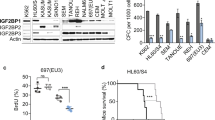Abstract
We have isolated a human cDNA clone encoding a novel protein of 22 kDa that is a human counterpart of the rat oncoprotein PTTG. We show that the corresponding gene (hpttg) is overexpressed in Jurkat cells (a human T lymphoma cell line) and in samples from patients with different kinds of hematopoietic malignancies. Analysis of the sequence showed that hPTTG has an amino-terminal basic domain and a carboxyl-terminal acidic domain, and that it is a proline-rich protein with several putative SH3-binding sites. Subcellular fractionation studies show that, although hPTTG is mainly a cytosolic protein, it is partially localized in the nucleus. In addition we demonstrate that the acidic carboxyl-terminal region of hPTTG acts as a transactivation domain when fused to a heterologous DNA binding domain, both in yeast and in mammalian cells.
Similar content being viewed by others
Author information
Authors and Affiliations
Rights and permissions
About this article
Cite this article
Domínguez, Á., Ramos-Morales, F., Romero, F. et al. hpttg, a human homologue of rat pttg, is overexpressed in hematopoietic neoplasms. Evidence for a transcriptional activation function of hPTTG. Oncogene 17, 2187–2193 (1998). https://doi.org/10.1038/sj.onc.1202140
Received:
Revised:
Accepted:
Published:
Issue Date:
DOI: https://doi.org/10.1038/sj.onc.1202140
- Springer Nature Limited
Keywords
This article is cited by
-
Phosphorylated PTTG1 switches its subcellular distribution and promotes β-catenin stabilization and subsequent transcription activity
Oncogene (2023)
-
PTTG1: a Unique Regulator of Stem/Cancer Stem Cells in the Ovary and Ovarian Cancer
Stem Cell Reviews and Reports (2019)
-
Integrated In Silico–In Vitro Identification and Characterization of the SH3-Mediated Interaction between Human PTTG and its Cognate Partners in Medulloblastoma
Cell Biochemistry and Biophysics (2018)
-
PTTG1 expression is associated with hyperproliferative disease and poor prognosis in multiple myeloma
Journal of Hematology & Oncology (2015)
-
Pttg1 inhibits TGFβ signaling in breast cancer cells to promote their growth
Tumor Biology (2015)




